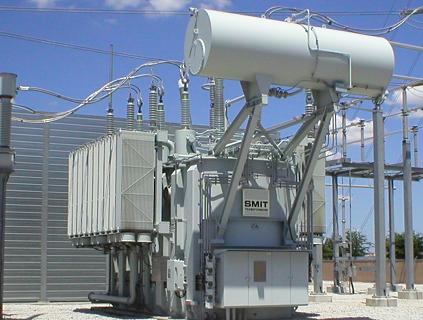
Image Credit: Smit Power Transformer
As an avid environmentalist with a casual awareness of the importance of energy conservation when I entered college in the 1970s, a chance situation clarified for me just how much energy could be saved through strong, concerted effort. Sometime in 1974 or ’75 (those years tend to run together for me for some reason), the transformer serving Ithaca College blew up.
The initial blackout was remedied after a day or two when the utility company hooked up an emergency transformer that could be used until the replacement was built–which was expected to take three months. (Large transformers are typically built to order; utility companies don’t have back-ups sitting on a shelf.) But this emergency transformer was one-third the size of the original–necessitating drastic conservation efforts on campus. I must have had a reputation for environmental activism, because I was tapped for an emergency response committee to coordinate student energy conservation efforts.
The situation was pretty dire. We had to cut electricity demand by two-thirds, and I remember the facilities manager warning us that students on a single floor of one dorm might be able to intentionally blow the undersized temporary transformer if they all turned on their lights at the same time. Such an action, we were told, would create a sudden surge in electricity use that would be too rapid for the facilities manager to respond to, and it could overtax the temporary transformer, causing it to fail.
As I think back on this, I’m pretty sure that those warnings were greatly exaggerated; other loads on campus would dwarf those of lighting on one floor of a dorm. But the warnings were effective in mobilizing campus-wide action. Our campus energy conservation committee photocopied fliers about energy savings. We made up placards and posted them next to the light switches in all of the college classrooms, urging students and faculty to use only necessary lighting and to turn off lights when leaving the room. We policed buildings to turn off unnecessary lights.
I’m sure that the vast majority of the emergency conservation efforts were focused on large loads, such as chillers, packaged air conditioning systems, and gymnasium lighting, but the response by the entire campus community–students, faculty, and staff–demonstrated to me just how significant coordinated efforts could be in saving energy. It was a great opportunity not only to solve an immediate problem–preventing a blackout that could shut down the school for several months–but also get significant, across-the-board buy-in to the benefits of energy conservation. (This wasn’t long after the first Energy Crisis, when an embargo of Mideast petroleum dramatically drove up the price of oil and put energy on the radar screen for Americans.)
And, the efforts were successful. Ithaca College was able to hold off another transformer failure during that several-month period. The experience has stuck with me throughout a career that has always focused on energy conservation as a cornerstone of responsible environmental policy. And, I suppose that that transformer failure in the 1970s, and our efforts to reduce electrical demand by two-thirds, set the stage for this weekly blog–the 100th installment of which you are now reading.
I invite you to share comments on this blog.
Alex Wilson is the executive editor of Environmental Building News and founder of BuildingGreen, LLC. To keep up with his latest articles and musings, you can sign up for his Twitter feeds.
Weekly Newsletter
Get building science and energy efficiency advice, plus special offers, in your inbox.















One Comment
Alex a great example of how
Alex a great example of how people can work together effectively as a community to solve problems. If we can apply this information to todays' issues and collectively practice conservation of energy , natural resources, and protect critical habitat, we can lower our carbon footprint and pave the way for energy independence, while developing solutions to the Climate Change Crisis.
Log in or create an account to post a comment.
Sign up Log in